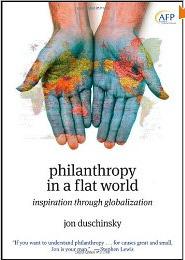Philanthropy in a flat world, inspiration through globalization
- Written by
- Jon Duschinsky
- Added
- June 03, 2011
Book review

Philanthropy in a flat world, inspiration through globalization by Jon Duschinsky
Reviewed for SOFII by Clare McDowall.
Sometimes a book can really change the direction of your life. This book did that for me.
I’d been working in community fundraising (third party events, to those on the American side of the Atlantic) for some time, engaging groups of people across Scotland with a cause we were all passionate about and supporting these groups and individuals to raise money. But it was at the Institute of Fundraising Scotland Conference in October 2010, where I picked up a copy of this book and where Ken Burnett introduced me to SOFII that really changed my experience of charity and of fundraising.
Jon Duschinky’s book is about throwing away the rule book. Like many other authors before him, he admits that philanthropy in a ‘flat world’ is scary: globalisation, choice, individualism, disappearing boundaries and, yes, transparency; these changes, he says, are not going away. He wants us instead to encourage failure, test new things, promote research and development and to do this with absolute transparency with our donors. Does that sound like the nonprofit you work for? Probably not.
Your donors have more access to information than ever before, information on your organisation and also information on every other organisation that works for the same cause that you do. Fail to involve these donors, rather than merely solicit them, at your peril. What Jon so expertly does in this book is take you from Martin Luther King’s inspirational and immortal words, ‘I have a dream’, to the realities of globalisation in our decade and then, most importantly, tells us what we can do about it.
- Rationalise – what is your core competency? What message do you want to communicate to people?
- Become sexy – but not in the ‘sex sells’ kind of way.
- Use your body – how do you present yourself? If your organisation were a person, would people want to talk to you at a party?
- Get hypersensitive – be brutally honest about people’s perception of your organisation.
On 26 December 2004, the Asian tsunami occurred. It prompted a mass outpouring of financial support to a range of humanitarian response charities around the world. On 5 January 2005, a mere ten days later, Médecins Sans Frontiers (MSF) in the USA advised that they had enough money to help the victims and reminded the public that there were many other situations around the world that also needed support. Did people stop giving to MSF and to the tsunami fund? Of course not; it made them feel better to do so regardless of the need, or not, of the beneficiaries.
Whilst this kind of transparency caused a fair bit of ruckus in the NGO world, it also made MSF ‘sexy’. They became much like the most popular kid in the class, generating the feeling of wanting to belong; that if everyone else wants to be their friend, so should I, which translated in this case to people feeling that if everyone else has given money to MSF, so should I. Clever.
I would suggest this book to anybody who is concerned that he or she, or his or her organisation, is not adapting to the philanthropic climate of the 2010s. You’ll feel informed, empowered and encouraged to do something about it. There is a huge opportunity open to the nonprofit world right now. People want to be connected, they want to be empowered and they want to feel passionate about something. After reading this book, my personal mission is to connect people to causes they care about, in a way that suits them. And I’ll continue to learn how to do that as long as I am alive. This book helped start that fire in me.
I’ll leave you with Jon’s words, he explains this more eloquently than I ever could:
‘Our time is now. And with that comes responsibility. We have the chance to make the world a better place. We have the tools to do it. The money is there. It is now up to us. We no longer have a choice. The world knows. It knows we have the opportunity and tools to change it. It is watching us. And it is generally not impressed.’
© Clare McDowall, 2011
About Clare McDowall
 Clare McDowall has been a fundraiser for six years. Originally from Scotland, where she worked for Oxfam as a community fundraising /third party events manager, she now lives in Toronto Canada. As well as being one of our Canadian ambassadors, she works as content manager at CharityVillage.com and as a social media and online branding consultant.
Clare McDowall has been a fundraiser for six years. Originally from Scotland, where she worked for Oxfam as a community fundraising /third party events manager, she now lives in Toronto Canada. As well as being one of our Canadian ambassadors, she works as content manager at CharityVillage.com and as a social media and online branding consultant.


















